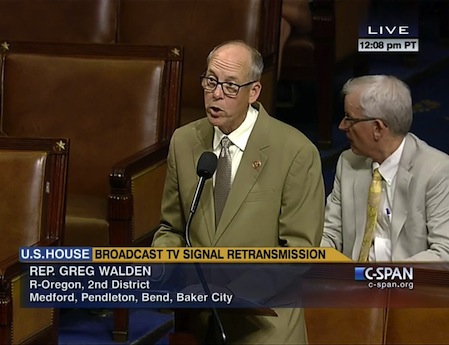House Passes STELAR on Voice Vote

The smarter way to stay on top of broadcasting and cable industry. Sign up below
You are now subscribed
Your newsletter sign-up was successful
The House Tuesday passed the STELA Reathorization Act (H.R. 4572), or STELAR, which renews the complusory license that allows satellite operators to import disant network TV station signals into markets that don't have one.
The bill also prevents coordinated retransmission consent negotiations between noncommonly owned TV stations in the same market and scraps the ban on integrated cable set tops, which cable ops wanted, and drops the prohibition on cable operators dropping TV station signals if retrans impasses coincide with Nielsen sweeps.
Also in a nod to broadcasters, the bill gives stations forced to unwind joint sales agreements per an FCC decision earlier this year 18 months to do so.
The Senate has yet to pass its version of the bill, but must either adopt this bill language or reconcile its version with the House bill before Dec. 31, when the current blanket license expires.
The bill also charges the FCC with studying FCC's use of Nielsen DMAs and whether there are any alternatives.
A bill that passed out of the Senate Judiciary Committee was a straight five-year renewal with none of the other targeted video reforms. That is the bill broadcasters have praised, though they won't mind getting that extra time to unwind the JSAs.
Legislators on both sides of the aisle stood in support of the bill during debate that was more of a coronation.
The smarter way to stay on top of broadcasting and cable industry. Sign up below
Rep. Jerrold Nadler (D-N.Y.) came the closest to a discouraging word, using his time to point out that there were serious questions about whether the compulsory license should be extended given that it was a marketplace workaround meant to help a fledgling satellite industry that had found its wings. But, he too, said he supported the bill and the five-year renewal he said would provide time to ponder that question.
Most of the legislators focused on the fact that the bill meant 1.5 million satellite customers, including many of their rural constituents, would not have their access to network TV stations cut off at the end of the year.
But there was also praise for the "targeted reforms" they appeared to agree leveled the retrans playing field. Rep. Peter Welch (D-Vt.) appeared pleased that broadcasters would get more time to unwind their JSAs as well as that coordinated retrans would be prevented. He said the targeted video reform provisions—sweeps, coordinated retrans, JSAs—would provide for regulatory parity.
Rep. Greg Walden (R-Ore.), referring to that retrans provision, said consumers will no longer have to worry about having to lose more than one signal during retrans impasses. Walden (pictured) urged the Senate to act swiftly to pass the bill. That passage likely won't be that swift. The Senate Commerce Committee has signaled it won't be taking up a bill until after the August recess.
He also said getting rid of the integration ban clears the way for cable innovation and investment.
Walden said that stakeholders on all sides of the issue had been engaged to figure out the right outcome, and this was it.
Contributing editor John Eggerton has been an editor and/or writer on media regulation, legislation and policy for over four decades, including covering the FCC, FTC, Congress, the major media trade associations, and the federal courts. In addition to Multichannel News and Broadcasting + Cable, his work has appeared in Radio World, TV Technology, TV Fax, This Week in Consumer Electronics, Variety and the Encyclopedia Britannica.

